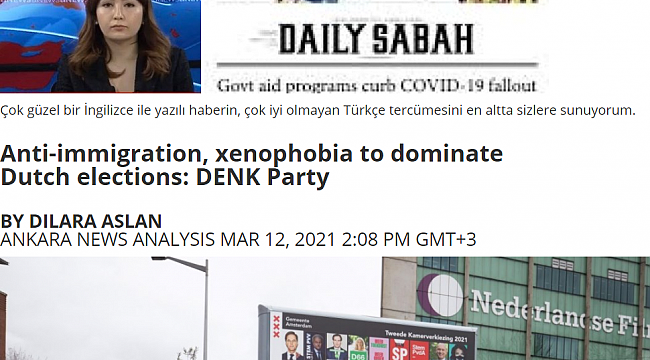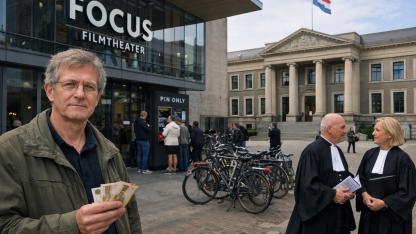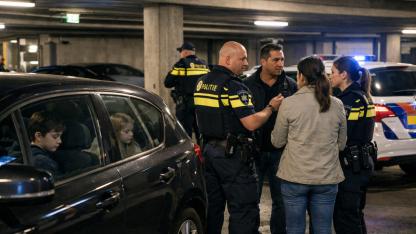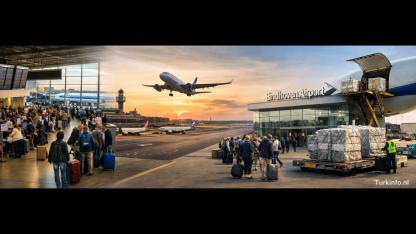Seçimlerde oy patlaması yapacağına inanılan Rutte’nin, Müslüman cihatçı olmasına rağmen, Hollanda halkı tarafından benimsendiği belirtilen haberde, ‘Amketlere göre Rutte, sadece bir sandalye kaybetti’ deniliyor.
Gazetenin deneyimli muhabiri Dilara Aslan, Hollanda’dan sağlıklı bilgi toparlayabileceği kişilerle temasa geçerek ilginç bir röportaj yazdı. Naçizane şahsım ile de temasa geçen Dilara Aslan’ın röportajını, Hollanda’daki beşyüze yakın medya kuruluşuna gönderdim.
Cyclists at a road crossing near Dutch political party election campaign posters on a billboard in Amsterdam, Netherlands, on Tuesday, March 9, 2021. (Getty Images)
As COVID-19 restrictions and anti-Islam, anti-immigration rhetoric come to the fore in the upcoming elections, the DENK party aims to tackle this problem and adopt a more inclusive stance in the Dutch political scene
The coronavirus pandemic and the much-debated issue of immigration are set to dominate the upcoming Dutch general elections as voters will head to the polls next week with Prime Minister Mark Rutte on course to win a fourth term in office.
“As in every election, populism, unfortunately, increases further. A policy against Turkey and Islam is emerging,” head of the Dutch DENK party and deputy Tunahan Kuzu told Daily Sabah, indicating that his party stands against those discriminating against people and defaming Islam.
Elaborating that DENK was created after having left the Labour Party in 2014 due to their rigid integration policies, Kuzu underlined that he aimed to build a new political movement in the face of a politics that is gradually becoming harder and leaning toward the right.
“Hundreds of thousands of youth of foreign origin living in this country are not treated equally due to a false integration policy,” Kuzu pointed out, saying that they even face discrimination in everyday routines, including in finding a job or renting a house. “We raise our voice so that our citizens of third-generation Turks, Moroccans, Surinamese have equal rights. Our role is to voice this everywhere, including in Parliament.”
The DENK party currently has three deputies in parliament as well as almost 30 council members in municipalities. The party is supported by Turkish, Moroccan, Surinamese and Dutch people. “Our message is not only to people of foreign origin but also to the Dutch people. The Netherlands belongs to all of us. The hundreds of thousands of foreign origin people in the country are a part of the Netherlands,” Kuzu highlighted.
Though the far-right has never been a major force in the Dutch political landscape, it has existed and attracted a substantial number of people.
 Tunahan Kuzu of DENK seen during the plenary debate in the Tweede kamer parliament on January 12, 2021 in The Hague, Netherlands. (Getty Images)
Tunahan Kuzu of DENK seen during the plenary debate in the Tweede kamer parliament on January 12, 2021 in The Hague, Netherlands. (Getty Images)
Despite the Netherlands recently suffering the worst riots for decades over its COVID-19 curfew, Prime Minister Mark Rutte leads in the polls as the Dutch appear to rally around the flag after a year of the pandemic.
But amid a tough COVID-19 lockdown, that support is showing signs of eroding as the Dutch grow weary of pandemic restrictions.
“Though the Dutch people are angry at Rutte due to the coronavirus restrictions, they will still give him enough votes to gain 39 seats due to their common sense,” journalist Ilhan Karaçay said.
Kuzu explained that although the atmosphere is influenced by the coronavirus pandemic, the DENK party still met with voters, listened to their problems and carried these issues to parliament.
Rutte leading
A total of 37 parties, the most for decades, are competing for 150 seats in the Dutch lower house of parliament, in a crowded political landscape that usually produces unwieldy coalitions.
The election is being held over three days, starting with a limited number of polling booths opening on March 15 and 16 for people who are extra vulnerable to the coronavirus before the main voting day on March 17. Some 2.4 million people aged 70 and above are entitled to vote by mail.
Rutte’s conservative People’s Party for Freedom and Democracy (VVD) is currently projected to win about twice as many seats as its nearest rival in the 150-seat lower house of parliament.
Rutte’s VVD currently has 33 seats and leads a four-party coalition along with the conservative Christian Democratic Appeal (CDA) and Christian Union, and the center-left D66.
If the VVD emerges as the largest party in parliament, the 54-year-old Rutte will be first in line to form the country’s next governing coalition and begin a fourth term in office. That would make him the longest-serving Dutch prime minister, overtaking the 12-year tenure of Ruud Lubbers.
The largest Dutch opposition party is the Party for Freedom led by populist, anti-Islam lawmaker Geert Wilders, who has harshly criticized the government’s handling of the COVID-19 crisis, from the slow start of its vaccination program to its imposing a curfew.
“Unfortunately, people like Wilders continue to defame Islam on a daily basis. Most parties have acknowledged this. Yet we do not hesitate to counter such racist acts everywhere and every time,” Kuzu added.
“Immigrants and Muslims are of course affected by such racist remarks. Racist and impudent words against Islam are normalizing and naturally, immigrants and Muslims are alienated,” he underlined, saying that therefore the people must unite and show they do not accept such language.
The right-wing populist Forum For Democracy of Thierry Baudet, which performed strongly two years ago during a provincial election, has imploded over the last year amid reports of anti-Semitism in its ranks.
“Geert Wilders and his kind are monsters created by 9/11. Previously, the Dutch people would not lean toward such ideologies. Infamous politicians such as (far-right Dutch politician Joop) Glimmerveen in the 1980’s and (Dutch politician of the Centre Party (CP) and later founder of the Centre Democrats (CD) party Hans) Janmaat in the 1990’s would not get votes,” Karaçay said.
He explained that however, after 9/11, a far-right politician, Pim Fortuyn, gained significant popularity but was murdered. The flamboyant Fortuyn, known for his far-right, anti-Islam and anti-immigrant stance, was gunned down in a parking lot by an animal activist, an act that shattered the liberal Netherlands’ image of itself as a unified and secure society.
Saying that Wilders is currently losing points, Karaçay stated that Baudet “of the same ideology” was quite popular in recent years and has gained a significant number of votes.
Conversely, Ibrahim Görmez, retired director of the Netherlands Islam radio and television institution stated that: “Unfortunately Wilders and Baudet have built their party programs upon anti-Islam rhetoric and have a huge vote potential,” indicating that other parties also see that such a path proves effective. “The DENK party in this regard is a big chance,” he continued.
Journalist Burhanettin Carlak explained that in the Netherlands the people are highly critical and question everything instead of following movements.
“I do not expect any change to the Dutch people’s ties to universal democracy and human rights. The Dutch are prudent, restrained and do not favor big political adventures,” he stated.
Saying that though marginal parties do not become the ruling party, they influence conventional parties, Carlak added: “Yet, currently there are again two racist, xenophobic and Islamophobic parties among the four main parties.”
Voting is as important for people of foreign origin as for the Dutch, Karaçay underlined, elaborating that the Netherlands in 1986 gave foreign nationals the right to vote for local elections, while it is obligatory to be a Dutch citizen to vote in general elections.
According to statistics, there are around 410,000 people with a migration background from Turkey in the country. Karaçay stated that around 230,000 have the right to vote and stand for elections, while he pointed out that there are 34 people of Turkish origin in the election lists of 37 parties.
Carlak further stated that the Dutch must see that the Turkish people in the country are not like other ethnic minorities and that the Turkish state should send Dutch-speaking officials to work in the country’s foreign missions to further raise the profile of Turks in the Netherlands as well as enhance bilateral relations.
He said that the foreign ministry and religious officials should be from the Netherlands while also touching upon the new judicial reforms in Turkey, saying they will also benefit Turks in the country.
Anti-immigration on rise
The last Dutch elections in 2017 sparked fears across Europe that Wilders could ride a wave of populism to victory after the 2016 Brexit vote in Britain and the election of Donald Trump in the US.
Wilders has recently said he has no regrets and is ready to “step up” his campaigning against immigration, despite the coronavirus set to dominate next week’s general election.
“Issues such as immigration are still important. For my voters, it’s still number one. But if you look at the average Dutchman, corona is the number one issue indeed,” Wilders told Agence France-Presse (AFP) in an interview at the Dutch parliament this week.
Despite that, Wilders said he saw no need to drop the anti-immigration and anti-Islam rhetoric that has defined his two-decade political career.
“The immigration of non-Western immigrants is an existential problem,” said Wilders. “I believe we should even step up, to invest more in realizing this policy (of opposing immigration).”
Rutte and other parties have vowed to exclude Wilders from any coalition, a move that the Freedom Party chief calls “very undemocratic.”
“The more people vote for my party, the more difficult it will be to exclude us,” Wilders said.
Karaçay similarly pointed out that “it is impossible that Wilders will be part of a coalition. No party wants to be in a coalition with them.”
 Members of a civic organization celebrate the victory of center-right VVD party in the general elections, in The Hague on March 15, 2017. (AFP Photo)
Members of a civic organization celebrate the victory of center-right VVD party in the general elections, in The Hague on March 15, 2017. (AFP Photo)
Wilders was also unrepentant about past actions, including plans for a cartoon competition of the Prophet Muhammad in 2018 that he canceled after receiving death threats.
He was also convicted of collectively insulting Moroccan people at a 2014 rally – though he was later cleared of discrimination.
Last month, Wilders also came under fire for a provocative post he shared on Twitter, calling Turkish President Recep Tayyip Erdoğan a “terrorist,” as officials criticized the lawmaker and prosecutors launched an investigation into his post.
Hate crimes against mosques and Muslims have been on the rise across Europe in recent years, fueled in part by the success of anti-immigrant, anti-Muslim groups in gaining political power.
“The rising populist, racist and anti-Muslim movement is indeed dangerous. Politicians must put emphasis on this issue. They have to reject this instead of normalizing it. This kind of politics complicates the futures of hundreds of thousands of youth and leads them to be alienated,” Kuzu stated, saying that everyone must be able to be proud of his identity and religion.
The combination of nationalism with an emphasis on anti-Islam and anti-EU rhetoric has appealed to some circles in the Netherlands.
According to the Migration Policy Institute, two traumatic events created an opening for Wilders on the Dutch political scene: the assassination of Fortuyn in 2002 and the subsequent 2004 murder of filmmaker Theo van Gogh by a Dutch-Moroccan citizen after he criticized the treatment of women in Islam.
“Wilders, who founded the radical-right PVV in 2006, capitalized on this by anchoring his platform in a virulent critique of Islam. And while his incendiary rhetoric has been disavowed by the mainstream, his popularity spiked after he was found guilty in December 2016 of hate speech against Moroccans,” it said in a report published during the previous elections.
Göçmenlik karşıtı, yabancı düşmanlığı Hollanda seçimlerine hakim olacak: DENK PartisiDİLARA ASLAN
ANKARA HABER ANALİZİ 12 MART 2021 14:08 GMT + 3
COVID-19 kısıtlamaları ve İslam karşıtı, göçmenlik karşıtı söylemler, yaklaşan seçimlerde öne çıkarken, DENK partisi bu sorunları çözmeyi ve Hollanda siyasi sahnesinde daha kapsayıcı bir duruş benimsemeyi hedefliyor.
Önümüzdeki hafta yapılacak olan Hollanda genel seçimlerine, koronavirüs salgını önlemleri, çok tartışılan göç meselesi, Başbakan Mark Rutte’nin, dördüncü dönem kazanıp kazanmayacağı soruları damgasını vuracak.
“Her seçimde olduğu gibi, popülizm maalesef daha da artıyor. Hollanda DENK Partisi (eski) Genel Başkanı ve milletvekili Tunahan Kuzu, Daily Sabah’a verdiği demeçte, Türkiye’ye ve İslam’a karşı bir politika ortaya çıkıtığını, partisinin insanlara karşı ayrımcılık yapan ve İslam’ı karalayanlara karşı olduğunu belirtti.
DENK’in, katı entegrasyon politikaları nedeniyle 2014 yılında İşçi Partisi’nden ayrıldıktan sonra kurulduğunu vurgulayan Kuzu, giderek zorlaşan ve sağa yönelen bir siyaset karşısında yeni bir siyasi hareket inşa etmeyi hedeflediğinin altını çizdi.
“Bu ülkede yaşayan yüz binlerce yabancı uyruklu genç yanlış bir entegrasyon politikası nedeniyle eşit muamele görmüyor” diyen Kuzu, iş bulma veya ev kiralama dahil günlük rutinlerinde ayrımcılığa bile maruz kaldıklarını belirttikten sonra, “Üçüncü kuşak Türk, Faslı, Surinamlı vatandaşlarımızın eşit haklara sahip olması için sesimizi yükseltiyoruz. Bizim rolümüz bunu Parlamento dahil her yerde dile getirmektir. ” diye ekledi.
DENK Partisi’nin şu anda mecliste üç milletvekili ve belediyelerde yaklaşık 30 meclis üyesi bulunuyor. Parti Türk, Fas, Surinam ve Hollandalılar tarafından destekleniyor. Kuzu, “Mesajımız sadece yabancı kökenli kişilere değil, aynı zamanda Hollanda halkına da. Hollanda hepimize aittir. Ülkedeki yüzbinlerce yabancı kökenli insan Hollanda’nın bir parçası” dedi.
Aşırı sağ, Hollanda’nın siyasi ortamında hiçbir zaman büyük bir güç olmamasına rağmen, var oldu ve önemli sayıda insanı kendine çekti.

Hollanda, son zamanlarda COVID-19 sokağa çıkma yasağı nedeniyle onlarca yıldır en kötü isyanlara maruz kalsa da, Başbakan Mark Rutte, salgından bir yıl sonra Hollandalılar’ın bir bayrak etrafında sandık başına gideceklerini söylüyor.
Ancak, zorlu bir COVID-19 kilitlenmesinin ortasında, Hollandalılar pandemik kısıtlamalardan bıktıklarını belirtiyorlar.
Gazeteci İlhan Karaçay, “Hollanda halkı koronavirüs kısıtlamaları nedeniyle Rutte’ye kızgın olsa da, sağduyuları nedeniyle ona 39 sandalye kazanması için yeterli oy verecek” diyor.
Kuzu, atmosferin koronavirüs salgınından etkilenmesine rağmen, DENK Partisi’nin seçmenlerle görüştüğünü, sorunlarını dinlediğini ve bu konuları meclise taşıdığını açıkladı.
Rutte lider
On yıllardır, genellikle hantal koalisyonlar üreten kalabalık bir siyasi ortamda, Hollanda parlamentosunun alt meclisinde 150 sandalye için 37 parti yarışıyor.
Seçimler, 17 Mart’taki ana oylama gününden önce, koronavirüse karşı ekstra savunmasız kişiler için 15 ve 16 Mart’ta sınırlı sayıda sandığın açılmasıyla üç gün boyunca yapılacak. 70 yaş ve üstü yaklaşık 2,4 milyon kişi posta ile oy kullanma hakkına sahiptir.
Rutte’nin muhafazakâr Özgürlük ve Demokrasi Halk Partisi’nin (VVD), şu anda parlamentonun 150 sandalyeli alt meclisinde en yakın rakibinin yaklaşık iki katı kadar sandalye kazanacağı tahmin ediliyor.
Rutte’nin VVD’si şu anda 33 sandalyeye sahip ve muhafazakar Christian Democratic Appeal (CDA) ve Christian Union ve merkez-sol D66 ile birlikte dört partili bir koalisyona liderlik ediyor.
VVD, parlamentodaki en büyük parti olarak yeniden ortaya çıkarsa, 54 yaşındaki Rutte, ülkenin bir sonraki hükümet koalisyonunu kuracak ve görevde dördüncü dönem başlayacak. Bu onu, Ruud Lubbers’ın 12 yıllık görev süresini geride bırakarak en uzun süre hizmet veren Hollanda Başbakanı yapacak.
Hollanda’nın en büyük muhalefet partisi, hükümetin COVID-19 krizini ele almasını, aşılama programının yavaş başlamasından zorla kabul ettirmesine kadar sert bir şekilde eleştiren popülist, İslam karşıtı milletvekili Geert Wilders liderliğindeki Özgürlük Partisi’dir (PVV)
Kuzu, “Maalesef Wilders gibi insanlar her gün İslam’ı karalamayı sürdürüyor. Çoğu parti bunu kabul etti. Yine de bu tür ırkçı eylemlere her yerde ve her zaman karşı koymakta tereddüt etmiyoruz ” dedi ve “Göçmenler ve Müslümanlar elbette bu tür ırkçı sözlerden etkileniyor. İslam’a karşı ırkçı ve küstah sözler normalleşiyor ve doğal olarak göçmenler ve Müslümanlar yabancılaşıyor ” diye devam etti.







Yorumlar
Kalan Karakter: